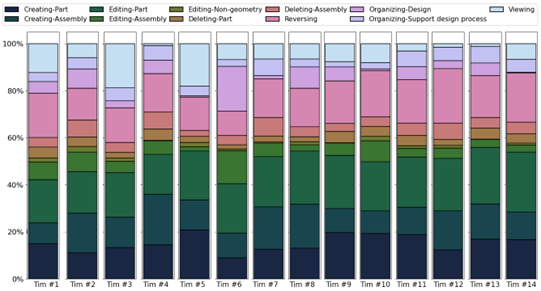The use of CAD (Computer-Aided Design) modelling is necessary for the successful implementation of later stages of product development. However, traditional CAD tools enable asynchronous operation, in which making changes to the CAD model is limited to only one member. The development of cloud computing allows a new paradigm of CAD collaboration - Multi-user CAD (e.g. synchronous work). To identify the advantages and disadvantages of the new way of working, it is crucial to follow the modelling process in this context. This paper proposes a methodology that, based on non-invasive work monitoring, enables the study of collaborative modelling in a CAD environment, and thus the identification of patterns. Within the methodology, classification of CAD activities is proposed, which serves as a basis for analysis. To support the methodology, computer code has been developed that categorizes and analyzes identified CAD activities. The methodology was validated by conducting a case study that included 14 development teams, which performed around 90000 CAD actions within the development project. The results show that teams with less CAD activity generate CAD models of poorer quality compared to teams with more activity performed. Also, it was found that teams that generated better quality CAD models recorded a higher ratio of CAD modification and deletion activities. During modelling, teams decrease the number of CAD creation and modification activities at the component level, while increasing the activity at the assembly level. Finally, teams show differences in individual contributions. The presented results allow development teams to better understand collaborative CAD modelling while the validated methodology provides researchers with a basis for analyzing CAD activities to understand collaboration and approach modelling during development projects.

Robert Celjak
2022
Rector award